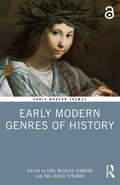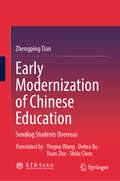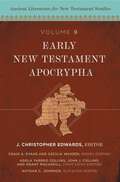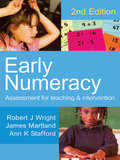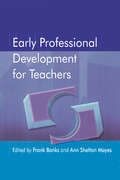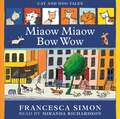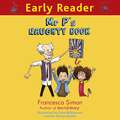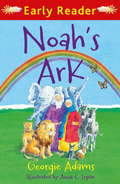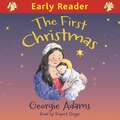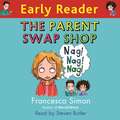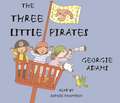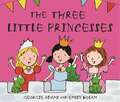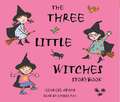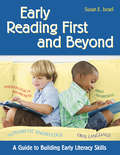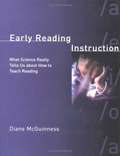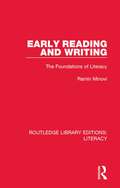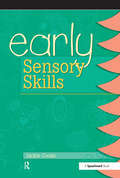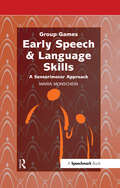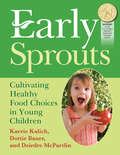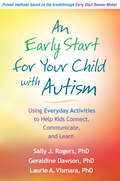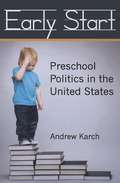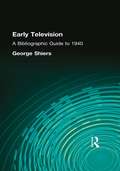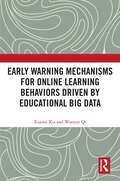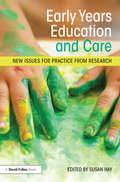- Table View
- List View
Early Modern Genres of History (Early Modern Themes)
by Emil Nicklas Johnsen Ina Louise StovnerBringing together an international group of literary scholars, intellectual historians, and cultural historians, this book discusses history in its various forms, either as texts or images in the early modern period (1500–1800).Early Modern Genres of History explores different genres and representational modes regarded as history before history became a scientific discipline during the nineteenth century. It does not seek to show how the modern discipline of history as an academic study developed, but rather to examine the ways in which historical texts and images became part of a wider field of early modern knowledge formations. This volume demonstrates how history was connected to the developments in the public sphere, how antiquarian historians used genres in their work, how history evolved and functioned in the visual field, and how historical genres travelled across different contexts. Overall, Early Modern Genres of History reveals how the diversity of historical representations in the early modern period has contributed to the broader foundations of history as it is understood in the twenty-first century.This volume is of great use to upper-level undergraduates, postgraduates, and scholars interested in early modern Europe and the history of knowledge across both the history and literature disciplines.
Early Modernization of Chinese Education: Sending Students Overseas
by Zhengping TianThis book offers readers a comprehensive overview of the Chinese educational modernization process, during which thousands of Chinese students studied overseas to find solutions for the reform of feudal education. The led to significant educational modernization between 1860 and 1940. Five topics are covered: the reasons Chinese students studied overseas; the three vital transmissions of the overseas study trend during these 80 years; returning students and the establishment and development of modern Chinese education science; overseas students and Chinese modern educational reform; and returning students and the establishment and development of the modern Chinese higher education system. The book is of interest to high school students, undergraduates and graduates in the fields of Chinese modern history and culture, Chinese educational modernization and modern Chinese education reform.
Early New Testament Apocrypha (Ancient Literature for New Testament Studies)
by ZondervanBroaden the scope of your New Testament studies with this introduction to early Christian apocryphal literature.To understand the New Testament well, it is important to study the larger world surrounding it, and one of the primary avenues for this exploration is through reading related ancient texts. But this task is daunting for scholars and novices alike given the sheer size of the ancient literary corpora. The Ancient Literature for New Testament Studies series aims to bridge this gap by introducing the key ancient texts that form the cultural, historical, and literary context for the study of the New Testament.Early New Testament Apocrypha offers an entry point into the corpus of early Christian apocryphal literature through twenty-eight texts or groups of texts. While the majority of the texts fall within the first four centuries CE, and therefore are useful for uncovering the earliest interpretations assigned to the New Testament, select later texts serve as reminders of how the meanings of New Testament texts continued to develop in subsequent centuries. Each essay covers introductory matters, a summary of content, interpretive issues, key passages for New Testament studies and their significance, and a select bibliography.Whether you are a scholar looking to familiarize yourself with a new corpus of texts or a novice seeking to undertake a serious contextualized study of the New Testament, this is an ideal reference work for you.Essays and contributors include:Part 1: Apocryphal GospelsAgrapha, Andrew GregoryFragments of Gospels on Papyrus, Tobias NicklasGospel of Barnabas, Philip JenkinsGospel of Peter, Paul FosterInfancy Gospel of Thomas, Reidar AasgaardJewish-Christian Gospels, Petri LuomanenLegend of Aphroditian, Katharina HeydenPilate Cycle, J. K. ElliottProtevangelium of James, Eric M. Vanden EykelToledot Yeshu, Sarit Kattan GribetzRevelation of the Magi, Catherine PlayoustPart 2: Apocryphal ActsActs of Andrew, Nathan C. JohnsonActs of John, Harold W. AttridgeActs of Paul, Harold W. AttridgeActs of Peter, Robert F. Stoops, Jr.Acts of Philip, Christopher R. MatthewsActs of Thomas, Harold W. AttridgeDeparture of My Lady Mary from This World (Six Books Dormition Apocryphon), J. Christopher EdwardsPseudo-Clementines, F. Stanley JonesPart 3: Apocryphal EpistlesJesus's Letter to Abgar, William AdlerCorrespondence of Paul and Seneca, Andrew GregoryEpistle to the Laodiceans, Philip L. TiteEpistula Apostolorum, Florence GantenbeinThe Sunday Letter, Jon C. LaansmaPart 4: Apocryphal ApocalypsesApocalypse of Paul, Jan N. BremmerApocalypse of Peter (Greek), Dan BatoviciApocalypse of Thomas, Mary Julia Jett1 Apocryphal Apocalypse of John, Robyn J. WhitakerNew Testament Apocrypha: Introduction and Critique of a Modern Category, Dale B. MartinSERIES DESCRIPTION:Ancient Literature for New Testament Studies is a 10-volume series that introduces key ancient texts that form the cultural, historical, and literary context for the study of the New Testament.Each volume features introductory essays to the corpus, followed by articles on the relevant texts. Each article will address introductory matters, provenance, summary of content, interpretive issues, key passages for New Testament studies and their significance, and a select bibliography.Neither too technical to be used by students no
Early Numeracy: Assessment for Teaching and Intervention (Math Recovery)
by Ann K Stafford Robert J Wright Mr James Martland'Unlike many books based on research work this book doesn't just let teachers know what is going wrong with children's learning it actually gives some practical advice about what to do next. The whole book is based upon extensive observation and recording of individual children and their difficulties with mathematics. These children are the most difficult to plan for in a busy classroom and the authors appreciate the small steps and the different learning styles approaches needed for these children. This approach fits well with the NNS wave and springboard materials but takes the analysis of the individual's difficulties to a more detailed level. The book brings together research carried out across a range of countries and therefore shows the versatility of the approaches taken. This will be a very useful book for trainee teachers as it exemplifies how to use assessment to feed into teaching. It will be helpful for class teachers and mathematics co-ordinators as well as SENCOs to assist in improving the teaching and learning for specific children in our schools' - Mary Briggs, Primary and Early Years PGCE Co-ordinator, Institute of Education, University of Warwick 'This is a highly practical resource that will be appreciated by classroom and specialist teachers alike. It will provide teachers new to the Math Recovery program with practical help and support to diagnose errors and misconceptions in early numeracy. Practicing Math Recovery Specialists will be thrilled with the addition of four new highly focused assessments and an elaboration of the Learning Framework in Number. Early Numeracy is admirably grounded in international research and well-established theory, characteristics that are much sought after in the current data driven educational environment. Like many others, I was drawn to Math Recovery after reading the first edition of Early Numeracy. This second edition is a treasure - it is exciting to consider the impact it will have on children and teachers, and to the growth of the Math Recovery program' - Audrey Murray, Lead Teacher, Midwest Math Recovery Training Center, Minneapolis This text has been fully updated to include developments and refinements brought about by widespread international application of the assessment tools in the Mathematics Recovery Programme. The book will help practitioners to identify and provide detailed analyses of all children but especially those who are able and those who underachieve in early numeracy. It will enable teachers, learning support personnel, numeracy consultants and educational psychologists to advise colleagues and parents on children's number knowledge and strategies for early numeracy. The Mathematics Recovery Programme has been successfully applied in Australia, the United Kingdom and Ireland, the United States and Canada, both in specialist interventions and classroom settings. The revised version shows how familiarisation with, and understanding of, the diagnostic assessment tools has allowed teachers to become more knowledgeable in understanding children's difficulties and misconceptions, and more skilled and confident in planning programmes of intervention and monitoring the children's progress. This new edition includes: - Integrated frameworks of useful tasks for assessing children's number knowledge and strategies; - Four separate and revised diagnostic assessment interviews; - Assessments for addition and subtraction strategies, Base Ten Arithmetical strategies, Early Grouping strategies, and Advanced Grouping strategies in the four operations; - How the assessment process has impacted significantly on teachers' professional development and contributed to the raising of standards in early numeracy.
Early Pregnancy Issues for the MRCOG and Beyond
by Geeta Kumar Bidyut KumarWith the emergence of early pregnancy issues in many hospitals, demand for educational support and the development of clear management guidelines is more pressing than ever. This book covers a wide range of early pregnancy-related issues, such as early pregnancy development, physiology and various pathological conditions encountered by clinicians in day-to-day practice, such as miscarriage, ectopic pregnancy, trophoblastic disease and hyperemesis gravidarum. The book is primarily designed to provide a comprehensive summary for candidates preparing for the Part 2 MRCOG examination, and as such covers the RCOG curriculum for early pregnancy issues. It is also a valuable guide for all healthcare professionals working in the field, including trainees, consultants and midwives.
Early Professional Development for Teachers
by Frank Banks Ann Shelton MayesEarly Professional Development has recently been recognized throughout the UK as a key area for improving the quality of teaching and learning in schools. All teachers need support to move from novice to expert. Set out here is a range of articles to help them achieve that goal. Included are practical strategies for investigating classrooms, ideas about teaching and learning, and key debates concerning professional development, all selected with the aim of moving classroom practice forward. This book offers teachers the opportunity to explore the latest debates on professional development as well as providing practical tips for use in the classroom, and is a rich resource for those teachers committed to developing their teaching for the benefit of their pupils.
Early Reader: Miaow Miaow Bow Wow (Early Reader)
by Francesca SimonDizzy the dog loves to sing, but the mean old Alley Cats won't let him join their chorus. But what do cats know about singing anyway? It's time to show them just what the dogs can do!(P)2004 Orion Publishing Group.Ltd
Early Reader: Mr P's Naughty Book (Early Reader)
by Francesca SimonAARDVARK: shouts atBAKED BEANS: drops on catKETCHUP: decorates mother withMr Punishment has the perfect punishment for every naughtiness in the world and every day his telephone rings with parents desperate for his advice. But Mr Punishment never seems to get it quite right - with chaotic results!Read by Steven Butler(P)2004 Orion Publishing Group.Ltd
Early Reader: Noah's Ark
by Georgie AdamsEarly Readers are stepping stones from picture books to reading books. A blue Early Reader is perfect for sharing and reading together. A red Early Reader is the next step on your reading journey. Georgie Adams' retelling of the story of Noah and the flood is written with delightful simplicity, and illustrated with charming soft watercolours in this full colour book, perfect for Early Readers.
Early Reader: The First Christmas (Early Reader)
by Georgie AdamsThe story of the birth of Jesus and the first Christmas retold with delightful simplicity, and illustrated with charming soft watercolours. Both text and pictures are designed to make this the perfect introduction to the Christmas story for very young children.(P)2004 Orion Publishing Group.Ltd
Early Reader: The Parent Swap Shop (Early Reader)
by Francesca SimonAva is sick and tired of her parents always telling her what to do. Nag nag nag. Why can't she have the kind of parents that let her eat sweets all day? Or parents who never make her go to bed, or eat vegetables?Then she sees an advert for the Parent Swap Shop, and Ava knows it's time to trade in the old ones for a new and improved Mum and Dad.(P)2004 Orion Publishing Group.Ltd
Early Reader: The Three Little Pirates
by Georgie AdamsTrixy, Tammy and Trig are three little girl pirates who live aboard The Lucky Lobster with their pets Mullet the dog, Kipper the cat and a seagull called Gulliver. Their friends include some boy pirates and a friendly sea-monster; and whenever they need to buy teabags or telescopes, all they need to do is to go to kind old Mr Spoons at Harbour Stores. When they hear about a nasty pirate who has been catching all the mermaidsin the sea, they set sail to rescue the last mermaid left - tiny Miney-Mo. Here's a delightful splash of ocean fun and adventure, following the same pattern as the highly successful THREE LITTLE WITCHES STORYBOOK. There are eight stories with clues to find and puzzles to solve.Read by Sophie Thompson(P)2004 Orion Publishing Group.Ltd
Early Reader: The Three Little Princesses
by Georgie AdamsPiccallili, Peaches and Pip are three little princesses who live in a beautiful palace in an enchanted land. Eight lively stories, packed with action and fun, show all the detail of their lives in the palace - their clothes, their toys, their tiaras - and take them on an exciting adventure in which, with the help of their fairy godmother, Miss Sponge, they outwit the horrid Gobblers. In the same format as the highly successful Three Little Witches and Three Little Pirates, and with the same fun and energy in words, pictures and design, this will be irresistible to every little girl who wants to be a princess.Read by Adjoa Andoh(P)2004 Orion Publishing Group.Ltd
Early Reader: The Three Little Witches Storybook
by Georgie AdamsZara, Ziggy and Zoe are three little witches who live together in Magic Wood, where anything can happen. Cups and saucers wash themselves up, letters sprout wings, a calendar sings a song, the signpost changes direction, and Wizard Wink's school moves from place to place. These seven stories show the little witches' daily doings and their preparations for a Hallowe'en party with Baby Dragon, the Troll family, two little wizard boys and a horrid little witch called Melissa.(P)2004 Orion Publishing Group.Ltd
Early Reading First and Beyond: A Guide to Building Early Literacy Skills
by Susan E. IsraelThis reader-friendly resource examines the key elements of Early Reading First to help teachers foster the language, cognitive, and early reading skills critical to young children's success in kindergarten.
Early Reading Instruction: What Science Really Tells Us About How To Teach Reading
by Diane McguinnessEarly Reading Instruction is a comprehensive analysis of the research evidence from early writing systems to computer models of reading. In this book, Diane McGuinness provides an innovative solution to the "reading war"--the century-old debate over the efficacy of phonics (sound-based) versus whole-word (meaning- based) methods. She has developed a prototype--a set of elements that are critical to the success of a reading method. McGuinness shows that all writing systems, without exception, are based on a sound unit in the language. This fact, and other findings by paleographers, provides a platform for the prototype. Other elements of the prototype are based on modern research. For example, observational studies in the classroom show that time spent on three activities strongly predicts reading success: learning phoneme/symbol correspondences, practice at blending and segmenting phonemes in words, and copying/writing words, phrases, and sentences. Most so-called literacy activities have no effect, and some, like sight word memorization, have a strongly negative effect. The National Reading Panel (2000) summarized the research on reading methods after screening out thousands of studies that failed to meet minimum scientific standards. In an in-depth analysis of this evidence, McGuinness shows that the most successful methods (children reading a year or more above age norms) include all the elements in the prototype. Finally, she argues, because phonics-type methods are consistently shown to be superior to whole-word methods in studies dating back to the 1960s, it makes no sense to continue this line of research. The most urgent question for future research is how to get the most effective phonics programs into the classroom.
Early Reading and Writing: The Foundations of Literacy (Routledge Library Editions: Literacy #15)
by Ramin MinoviOriginally published in 1976. This book is about the teaching of reading and writing in infant schools around Britain for all parents and teachers. It outlines some schemes, approaches, methods and developments but focuses on the pragmatic application. The acquisition and growth of literacy must be seen in the context of the child's total language development, and this book devotes some space to the before-school experience and how parents can help their children.
Early Sensory Skills (Early Skills)
by Jackie CookeThis is a huge compendium of practical and enjoyable activities for touch, vision, taste and smell. Invaluable to anyone working with young children, the text outlines major principal and aims followed by six easy-to-use sections containing basic activities, games and topics to stimulate the senses. The activity sheets contain full instructions, as well as suggestions for variations and similar activities. It provides simple checklists to record a child's progress. It includes photocopiable material throughout with activity sheets, games and plenty of carryover work.
Early Speech & Language Skills: A Sensorimotor Approach (Group Games Ser.)
by Lilo Seelos Maria MonscheinFull of practical ideas that can be easily implemented with minimal preparation, this book contains a wealth of games and activities for developing language with young children. Following a multi-sensory approach, the games focus on having fun and working on speech language difficulties without having to concentrate directly on speaking. The games are organised around the school year and are themed according to which sense they specifically aim to develop. Most games can be carried out with little preparation, are easily adaptable and can be differentiated according to different children's abilities. Includes: Sense of touch games; Games for proprioception; Balancing games; Listening games; Games for developing hand-eye coordination and finger-motor skills; Games for promoting oral motor skills; Games for working on individual problematic speech sounds.
Early Sprouts
by Karrie Kalich Dottie Bauer Deirdre McpartlinTo counteract the prevalence of childhood obesity and to establish lifelong healthy eating habits, this research-based early childhood curriculum is designed to increase children's preferences for nutritious fruits and vegetables. The tested "seed-to-table" approach will engage preschoolers in all aspects of planting, growing, and eating organically grown foods. Also included are recipes children can help prepare and ways to involve the whole family in making healthy food choices. These activities can be tailored to fit any early childhood program, climate, or geographical region.
Early Start for Your Child with Autism
by Geraldine Dawson Sally J. RogersCutting-edge research reveals that parents can play a huge role in helping toddlers and preschoolers with autism spectrum disorders (ASD) connect with others and live up to their potential. This encouraging guide from the developers of a groundbreaking early intervention program provides doable, practical strategies you can use every day. Nearly all young kids-including those with ASD-have an amazing capacity to learn. Drs. Sally Rogers, Geraldine Dawson, and Laurie Vismara make it surprisingly simple to turn daily routines like breakfast or bath time into fun and rewarding learning experiences that target crucial developmental skills. Vivid examples illustrate proven techniques for promoting play, language, and engagement. Get an early start-and give your child the tools to explore and enjoy the world.
Early Start: Preschool Politics in the United States
by Andrew KarchIn the United States, preschool education is characterized by the dominance of a variegated private sector and patchy, uncoordinated oversight of the public sector. Tracing the history of the American debate over preschool education, Andrew Karch argues that the current state of decentralization and fragmentation is the consequence of a chain of reactions and counterreactions to policy decisions dating from the late 1960s and early 1970s, when preschool advocates did not achieve their vision for a comprehensive national program but did manage to foster initiatives at both the state and national levels. Over time, beneficiaries of these initiatives and officials with jurisdiction over preschool education have become ardent defenders of the status quo. Today, advocates of greater government involvement must take on a diverse and entrenched set of constituencies resistant to policy change. In his close analysis of the politics of preschool education, Karch demonstrates how to apply the concepts of policy feedback, critical junctures, and venue shopping to the study of social policy.
Early Television: A Bibliographic Guide to 1940
by George ShiersFirst Published in 1997. Routledge is an imprint of Taylor & Francis, an informa company.
Early Warning Mechanisms for Online Learning Behaviors Driven by Educational Big Data
by Xiaona Xia Wanxue QiThe book aims to design and construct early warning mechanisms based on the dynamic temporal tracking technology for online learning behaviors, driven by educational big data.By studying a massive amount of learning behavior instances generated in various interactive learning environments worldwide, the book explores the continuous sequences of correlated learning behaviors and characteristics. From various angles, the authors have devised a series of early warning measures that could effectively solve multiple issues in learning behaviors driven by educational big data. Additionally, the book predicts patterns and identifies risks by analyzing the temporal sequences of the entire learning process. While presenting a range of theoretical achievements and technical solutions to improve and design new online learning mode, it also provides relevant technical ideas and methodologies for research on similar problems.The book will attract scholars and students working on learning analytics and educational big data worldwide.
Early Years Education and Care: New issues for practice from research
by Susan HayWhat are the new benchmarks for the future in good early years’ provision? What should children and parents expect from practice given recent research evidence on how young children thrive? Developing and managing early years provision has changed significantly over the last few years. Parental expectations, policy creep, bureaucracy overload, inadequate training, a litigious climate, over-dependence on screens, traffic danger and child protection anxiety are among the many challenges now faced by early years providers. This timely new book explores the key issues faced by settings and what they mean for early years practice. Looking at the real evidence around children’s learning and wellbeing, parental preference and social trends, the book covers: Neuro-scientific research into the way children learn What parents know and expect Children’s wellbeing The indoor and outdoor environment Adult intervention The risk/benefit equation Nutrition, health and exercise Drawing on examples of outstanding practice from a wide range of settings, this exciting new book will help practitioners reach beyond what is expected and provide the very best for the children in their care.
